 The purpose of this blog post is to discuss who must be named in a partition lawsuit. It is important to name all the necessary parties so that the Court can properly issue a judgment at the conclusion of the partition action. As partition lawsuits involve rights to property, it is pretty obvious that the owners of the property and the mortgage broker should be joined. But the question becomes more difficult as the interests become less connected, like easement holders or other persons who have liens against the individual owners. As such, this article aims to provide clarity on the process.
The purpose of this blog post is to discuss who must be named in a partition lawsuit. It is important to name all the necessary parties so that the Court can properly issue a judgment at the conclusion of the partition action. As partition lawsuits involve rights to property, it is pretty obvious that the owners of the property and the mortgage broker should be joined. But the question becomes more difficult as the interests become less connected, like easement holders or other persons who have liens against the individual owners. As such, this article aims to provide clarity on the process.
What Does the Law Say?
Under Code of Civil Procedure section 872.510, the plaintiff must join as defendants all persons having or claiming interests in the estate, persons who are actually known to the plaintiff to have such interests, or persons who, from an inspection of the property, appear to have such interests. Sections 872.510 to 872.550 define “interest,” as situations, includes liens, and a “lien” means a mortgage, deed of trust, or other security interest in property whether arising from contract, statute, common law, or equity. According to the Legislative Committee Comment, under Section 872.510, only persons having interests in the estate or estates as to which partition is sought need to be joined.
 California Partition Law Blog
California Partition Law Blog


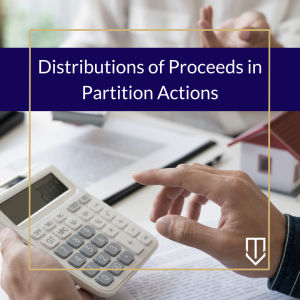 Before the owners receive the proceeds from a partition sale, costs and expenses related to the
Before the owners receive the proceeds from a partition sale, costs and expenses related to the  Recently,
Recently, 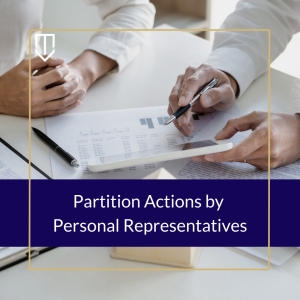 Often times, a person’s estate includes property. While property disputes between co-owners are complicated enough, a property dispute including the estate of a deceased person adds an entirely different layer of complexity to the situation. In these instances, there are special laws that apply to help to clarify the process.
Often times, a person’s estate includes property. While property disputes between co-owners are complicated enough, a property dispute including the estate of a deceased person adds an entirely different layer of complexity to the situation. In these instances, there are special laws that apply to help to clarify the process. 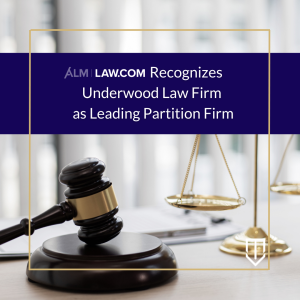 Underwood Law Firm is a finalist for the California Legal Awards’ Vanguard Award.
Underwood Law Firm is a finalist for the California Legal Awards’ Vanguard Award.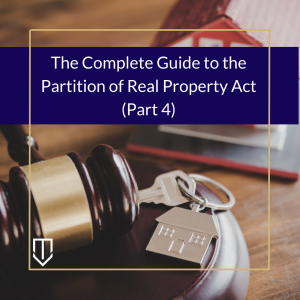 This is a continuation of our ongoing series on the Complete Guide to the Partition of Real Property Act. For complete comprehension, we would suggest
This is a continuation of our ongoing series on the Complete Guide to the Partition of Real Property Act. For complete comprehension, we would suggest 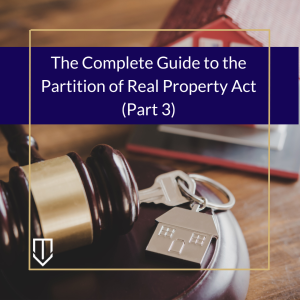 How does the court appraise the property (CCP § 874.316)?
How does the court appraise the property (CCP § 874.316)?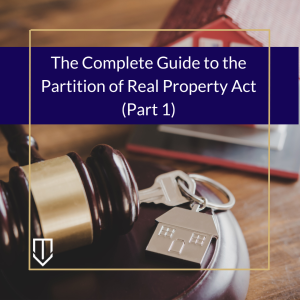 It’s rare that a new law comes along that turns an entire established legal practice on its head. Yet that’s precisely what California’s Partition of Real Property Act intends to do. Revised in 1976,
It’s rare that a new law comes along that turns an entire established legal practice on its head. Yet that’s precisely what California’s Partition of Real Property Act intends to do. Revised in 1976, 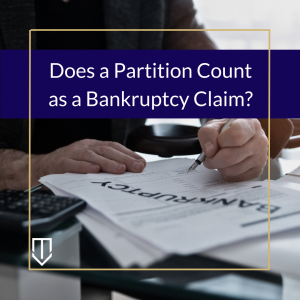 Yes, it can. Partitions and bankruptcy can interact in unusual ways despite the fact that they can often seek the same thing: the sale of a piece of property.
Yes, it can. Partitions and bankruptcy can interact in unusual ways despite the fact that they can often seek the same thing: the sale of a piece of property.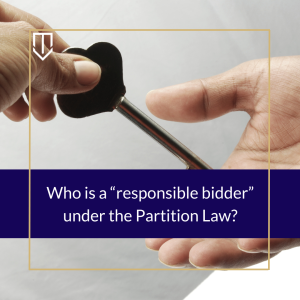 Under the Partition Law, “[a] bidder is responsible if it can perform the contract as promised.” (PCC § 20162; Valley Crest Landscape, Inc. v. City Council (1996) 41 Cal.App.4th 1432, 1438.) That means, in essence, that it can be determined from the face of the bid itself that it will be viable, without outside investigation or information. (Taylor Bus Service, Inc. v. San Diego Bd. Of Education (1987) 195 Cal.App.3d 1331, 1342.)
Under the Partition Law, “[a] bidder is responsible if it can perform the contract as promised.” (PCC § 20162; Valley Crest Landscape, Inc. v. City Council (1996) 41 Cal.App.4th 1432, 1438.) That means, in essence, that it can be determined from the face of the bid itself that it will be viable, without outside investigation or information. (Taylor Bus Service, Inc. v. San Diego Bd. Of Education (1987) 195 Cal.App.3d 1331, 1342.)